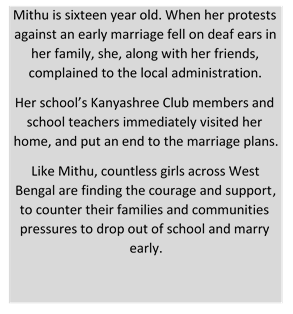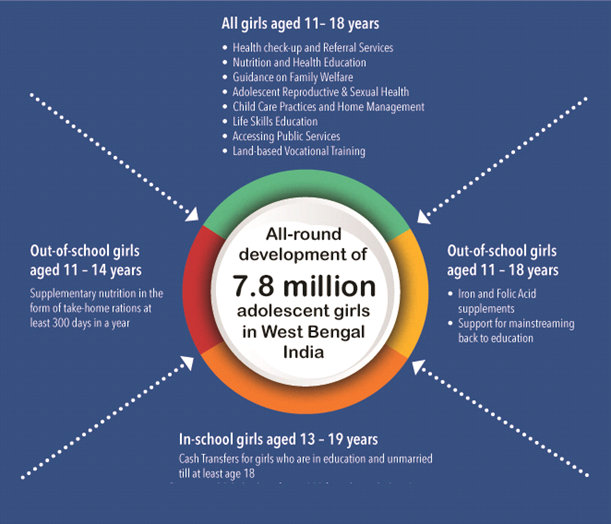Public sector transformation is critical component in achieving the Sustainable Development Goals (SDGs). One of the ways the Division for Public Institutions and Digital Government of the United Nations Department of Economic and Social Affairs promotes transformation is through recognizing successful public sector innovations around the globe through its flagship activity United Nations Public Service Awards (UNPSA). The annual programme rewards the achievements and contributions of public institutions and highlights good practices for inspiration and possible replication in other countries.
We followed up with the past UNPSA winners to share the updates on their initiatives.
2017 UNPSA Winner: Kanyashree Prakalpa, Department of Women, Child Development and Social Welfare, Government of West Bengal, India
India’s Constitution guarantees its citizens the fundamental rights to equality, freedom, and education, and the right against exploitation. The reality however was that for the majority of girls from disadvantaged backgrounds across the country, such rights remained out of reach with child marriage and other gender-discriminatory practices common.
In October 2013, the Government of West Bengal, India, launched Kanyashree Prakalpa, a conditional cash transfer scheme that provides a safety net for those vulnerable families who are forced, by tradition, social compulsion or poverty, to truncate the education of their daughters and contract them to wholly illegal and dangerous marriages. Kanyashree’s strategy directly strikes at the inter-linked issues of child marriage and female school dropouts. The Scheme provides every adolescent girl between the age of 13 and 18 with an annual scholarship, and a one-time grant when she graduates from the scheme at age 18. The stipulation being, of course, that participating girls are in school and unmarried at the time of getting the benefits. To reinforce the positive impact of increased education and delayed marriages, the scheme also works to enhance the social power and self-esteem of girls through a range of “cash plus” interventions.

Kanyashree girls report feeling empowered - it is not just the prospect of receiving a grant y that empowers them, but that they receive it in bank accounts that are opened in their own names. It has put on hold their parents’ quest for a suitable groom. Many girls have grasped the opportunity to start a new dialogue with their parents, a dialogue in which they dare to speak of their future identities forged through continued education and professional training, identities that may or may not include marriage.
In 2017, when the Scheme was awarded the UN Public Service Awards the category “Reaching the poorest and most vulnerable through inclusive services and participation”, it had covered 4 million adolescent girls, with almost 1 million having reached age 18 with a complete school education, and without child marriage. Two and a half years later, the numbers have doubled. The Scheme has covered over 6 million girls since its launch in 2013, with 2.3 million girls graduating from it at age 18. The government has increased the annual scholarship amount, and removed the income ceiling, effectively universalizing the scheme for all adolescent girls who comply with its core message: “Say YES to education and NO to child marriage”.
In 2017, Kanyashree’s “cash plus” interventions were pilot initiatives implemented in select locations. Today, the Government of West Bengal implements a state-wide integrated set of schemes for adolescent girls that reaches them through both school and community platforms and provides them with a range of services and linkages to facilitate their all-round development. This programme is described in the graphic below.

Figure: Schemes for Adolescent Girls in West Bengal, India
The Kanyashree journey however, has just begun. Across the world it is acknowledged that young people are an important demographic whose time has come. Kanyashree girls are at the age when they are establishing their individuality and their own voice. Given adequate support, they have the ability to articulate their needs and desires, demand their rights and make their own choices. More important – they have tremendous potential as drivers for change.
However, the entire responsibility of transformation should not rest on the shoulders of the girls. Several systems – educational, health, social and commercial - need to work towards creating an environment in which girls aspire to become whatever they desire, including leaders, professionals or entrepreneurs. We must not lose sight of the fact that Kanyashree girls’ bank accounts are just a tool; true financial inclusion will be when these bank accounts see regular deposits and withdrawals that signify healthy, productive and happy lives.
For West Bengal to reap the benefits of its investment in its adolescent girls, policy makers need to see beyond the economic dividend of preventing child marriage to building a cohort of confident, responsible and active citizens, girls and boys, men and and women, whose values and actions contribute towards a more equitable, violence-free society and sustainable development.
For more information on Kanyashree Prakalpa and other winning initiatives, visit the UN Public Service Innovation Hub
Kanyashree Prakalpa, Department of Women, Child Development and Social Welfare, Government of West Bengal, India (2017 UN Public Service Award Winner on the category on Reaching the poorest and most vulnerable through inclusive service and partnership)
 Добро пожаловать в ООН!
Добро пожаловать в ООН!